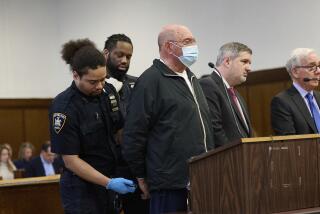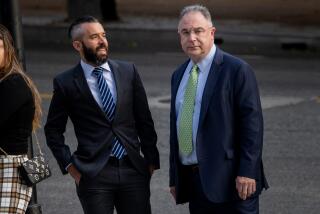Hubbell Gets 21 Months in Fraud Case : Courts: Former Justice Department official targeted in Whitewater probe is sentenced for overbilling law firm and clients and evading taxes.
- Share via
Webster L. Hubbell, a close friend of President Clinton and a former top Justice Department official, was sentenced Wednesday to 21 months in prison for defrauding the Arkansas law firm where he and First Lady Hillary Rodham Clinton once worked together as partners.
While Hubbell’s crime did not involve the Clintons, he is the most prominent and nearest acquaintance of the First Family to be swept up by the wide-ranging Whitewater investigation, which originally focused on the President and his wife.
Members of Hubbell’s family wept as U.S. District Judge George Howard Jr. of Little Rock, Ark., imposed the longest jail term given to any defendant so far as a result of the 18-month inquiry now led by independent counsel Kenneth W. Starr.
At the White House, the Clintons issued a statement saying that Hubbell had “given much to his family, state and country.” They noted that he had “assumed full responsibility for his mistakes and accepted the consequences of his actions.”
Eleven people have been charged or pleaded guilty to charges arising from the probe, but only three have been sentenced.
Hubbell has been cooperating with Starr since pleading guilty last December to charges of mail fraud and tax evasion. He admitted to falsely claiming $482,410 in expense reimbursements from the Rose Law Firm and his former clients and evading $143,747 in federal income taxes.
But his cooperation did not win him as significant a reduction in his sentence as he apparently had hoped. Although Hubbell could have drawn a sentence of as long as 27 months under federal sentencing guidelines, he had asked for a reduced term of 16 months.
Standing sheepishly before the judge, according to courtroom observers in Little Rock, Hubbell seemed humbled by the events that have transported him back to Arkansas from the inner circles of power in Washington.
A onetime football star at the University of Arkansas and former chief justice of the Arkansas Supreme Court, he served as the third-ranking official in Clinton’s Justice Department before he was forced to resign to deal with the investigation of his finances.
“What’s really been tough is looking my family in the eye and telling them I was wrong,” Hubbell told the judge. He said that while it was not in his nature to steal, he had done so because he saw no other way to extract himself from his financial difficulties.
Ron Clark, managing partner of the Rose firm where Hubbell and Hillary Clinton were partners before going to Washington, expressed sympathy for his former colleague and the Hubbell family. The firm provided Starr with much of the evidence against Hubbell.
“We certainly take no joy in the difficult times being experienced by Mr. Hubbell and his family,” Clark said. “It’s a sad occasion.”
In addition to serving a jail term, beginning on Aug. 7, Hubbell was instructed to make restitution of $135,000 of the money he stole. He was also instructed to talk to prison inmates about the importance of family and education to fulfill a community-service requirement.
As a result of his plea bargain, Hubbell has spent more than 100 hours since December answering questions put to him by Whitewater prosecutors. But he provided no information implicating the President in any crime, according to knowledgeable sources.
In exchange for Hubbell’s cooperation, Starr showed some restraint by making no recommendation to the judge regarding the sentence.
In a memo submitted to the court last Friday, Hubbell’s lawyers sought a reduced sentence on grounds that he is a man “who has devoted such a large part of his life doing for others--making his community a better place to live.” They asked Howard to consider a sentence of no more than 16 months in prison, in view of his community service and commitments to charities.
But in a response brief, Starr noted that these charitable activities were often funded with money Hubbell stole from his clients.
More to Read
Sign up for Essential California
The most important California stories and recommendations in your inbox every morning.
You may occasionally receive promotional content from the Los Angeles Times.










